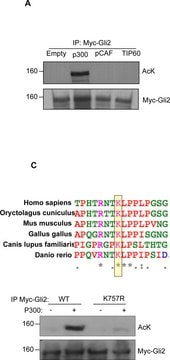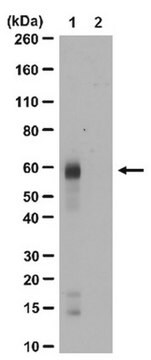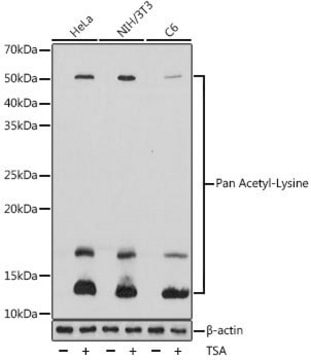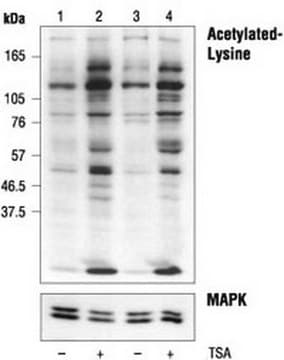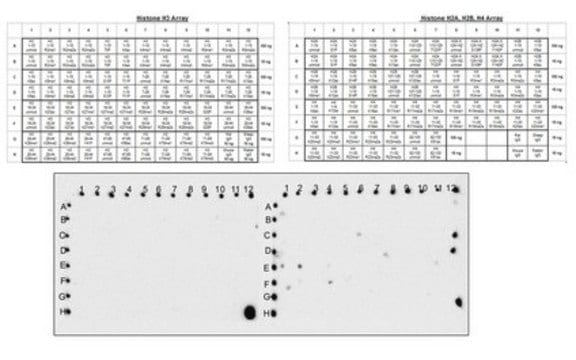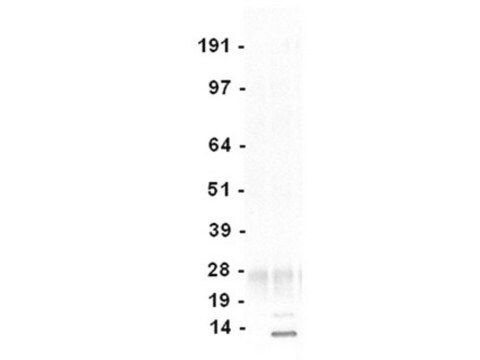AB3879
Anti-Acetyl Lysine Antibody
Chemicon®, from rabbit
About This Item
Produits recommandés
Source biologique
rabbit
Niveau de qualité
Forme d'anticorps
affinity isolated antibody
Type de produit anticorps
primary antibodies
Clone
polyclonal
Produit purifié par
affinity chromatography
Réactivité de l'espèce (prédite par homologie)
all
Fabricant/nom de marque
Chemicon®
Technique(s)
ELISA: suitable
immunofluorescence: suitable
immunohistochemistry: suitable
immunoprecipitation (IP): suitable
western blot: suitable
Conditions d'expédition
wet ice
Modification post-traductionnelle de la cible
acetylation (Lys)
Description générale
Spécificité
Immunogène
Application
A previous lot was used at 10 µg/mg crude protein.
ELISA:
0.25-1 μg/mL of a previous lot was used.
Immunohistochemistry:
2.5 μg/mL of a previous lot was used.
Immunofluorescence:
5 μg/mL of a previous lot was used.
Optimal working dilutions must be determined by end user.
Signaling
Epigenetics & Nuclear Function
General Post-translation Modification
Histones
Qualité
Western Blot Analysis: 1:500 dilution of this lot detected lysine acylated proteins on 10 μg of Hela Acid Extract/Sodium Butyrate lysates.
Forme physique
Stockage et stabilité
Handling Recommendations:
Upon first thaw, and prior to removing the cap, centrifuge the vial and gently mix the solution. Aliquot into microcentrifuge tubes and store at -20°C. Avoid repeated freeze/thaw cycles, which may damage IgG and affect product performance. Note: Variabillity in freezer temperatures below -20°C may cause glycerol containing solutions to become frozen during storage.
Remarque sur l'analyse
TSA-treated HeLa and NIH/3T3 cells, osteosarcoma tissue.
Autres remarques
Informations légales
Clause de non-responsabilité
Not finding the right product?
Try our Outil de sélection de produits.
Code de la classe de stockage
10 - Combustible liquids
Classe de danger pour l'eau (WGK)
WGK 2
Certificats d'analyse (COA)
Recherchez un Certificats d'analyse (COA) en saisissant le numéro de lot du produit. Les numéros de lot figurent sur l'étiquette du produit après les mots "Lot" ou "Batch".
Déjà en possession de ce produit ?
Retrouvez la documentation relative aux produits que vous avez récemment achetés dans la Bibliothèque de documents.
Notre équipe de scientifiques dispose d'une expérience dans tous les secteurs de la recherche, notamment en sciences de la vie, science des matériaux, synthèse chimique, chromatographie, analyse et dans de nombreux autres domaines..
Contacter notre Service technique